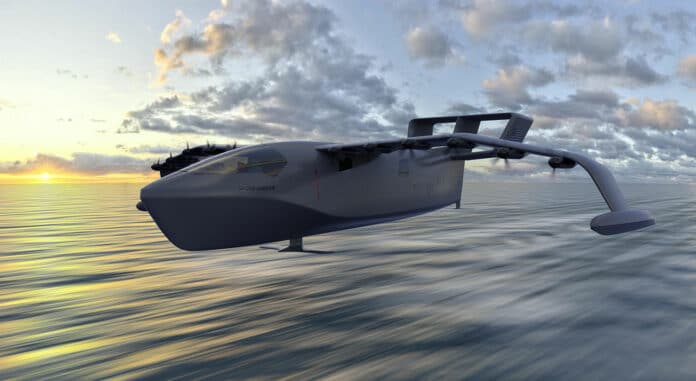REGENT, the manufacturer of all-electric seagliders for sustainable maritime mobility, has signed an agreement with the Marine Corps Warfighting Lab (MCWL) to demonstrate seaglider technology for defense logistics operations.
Seagliders are often associated with leisure activities such as island hopping, tourism, and resort transportation. These aircraft that operate close to the water’s surface bring vacations, travel, and beautiful coastal cities to mind. However, they can also play a pivotal role in defense logistics.
The US Marine Corps recognized this and recently invested $4.75 million in a Rhode Island-based startup to build seagliders that support the nation’s servicemembers in contested maritime environments.
Seagliders are a hydrofoiling wing-in-ground effect craft that uses hydrofoils to lift off the water and glide at high speeds. These novel electric aircraft claim to combine an airplane’s high speed with a boat’s operational low costs. It offers the benefits of zero-emission, ultra-low-altitude transportation without the need for runways or special facilities. It can use existing docks and harbors as its landing and take-off sites.
They are designed for the maritime domain and can address a recognized gap within the U.S. Department of Defense for high-speed, low-cost, low-signature, runway-independent mobility in the littorals and fulfill a range of missions. Seagliders can perform various tasks for the DOD, such as transporting troops and cargo, establishing advanced base operations, and providing communications.
REGENT’s Viceroy seaglider is a model that can carry 12 people or 3,500 lbs (1,587 kg) of payload and travel up to 180 miles (289 km) on a single battery charge. As battery technology improves, it aims to achieve a zero-emission range of 500 miles (800 km) in the near future.
“In the littorals, we have to move, and signature management is critical,” said Ret. General Robert Neller, who served as the 37th Commandant of the Marine Corps and now sits on REGENT’s Defense Advisory Board. “REGENT seagliders provide the ability to distribute multiple capabilities in the littorals, including logistics, command and control, and ISR. The REGENT seaglider capabilities will create success.”
The program aims to test the seaglider’s ability to operate in each of its hull, foil, and wing-borne modes of operation. It also seeks to identify the risks and certification requirements for the craft and explore its potential for military applications, such as maneuvering and transporting. The program will end with a live demonstration of the full-scale prototype in a large-scale exercise hosted by the U.S. Government.
